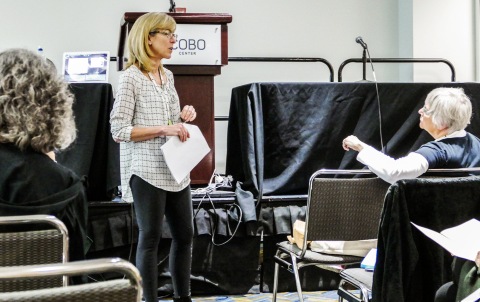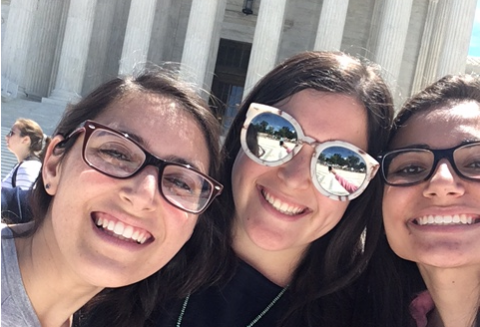Jewish feminists must answer the call

By Nina Henry, NCJW Legislative Intern
This Saturday was Yom Kippur, the holiest day of the Jewish year, and I found my congregation in the streets.
I felt obligated to attend the March for Black Women in accordance with the Torah’s commandment to pursue justice. I came to faith-based organizing in reverse of the traditional way: I’d always cared about social justice, but I’d never considered myself a particularly spiritual person. As I got more involved in advocacy, it began to feel more and more like a religious calling, a moral imperative rooted in my Jewishness. As civil rights activist Rabbi Joshua Heschel once wrote, “When I was marching, I was praying with my feet.”
There’s an indescribable feeling when you take to the streets with hundreds of other people. A cheer went up as we flooded down Constitution Avenue, and hundreds of us marched all the way to the Trump Hotel. Then one woman shouted, “Take a knee!” and people in the crowd began to shout it back over their shoulders, until it traveled down the street to the end of the march. We knelt as one, and it was a profoundly respectful gesture of mourning. Any congregant will recognize the powerful feeling of awe when hundreds of people bow their heads in silence. Then the same organizer shouted, “Black women, stand up!” The Black women in the march stood to be recognized for their often-ignored leadership, and the crowd spontaneously broke into applause and cheers. It was both a deeply moving experience and a spiritual moment in which we dedicated ourselves to fighting injustice together.
Yom Kippur teaches us that it is not enough to atone for one’s sins. We must actively apologize, make amends, and pursue justice. As a white woman, I grew up ignorant of the battles that Black women and girls have been fighting for centuries against institutionalized white supremacy, sexual violence, police brutality, and reproductive coercion. One of the speakers at the rally pointed out every building on the National Mall that had been built by enslaved people, and I was ashamed, not only because I didn’t know, but because I’d never even thought about it. It’s wonderful that so many white women are speaking out in the aftermath of the 2016 election, but it is so much more important that white women listen to women of color, who have never had the luxury of complacency.
If being asked to listen as much as you speak bothers you, it pales in comparison to what Black feminists have suffered at the hands of white women for hundreds of years. In 1913, the National Women’s Party led a national march on Washington to advocate for women’s suffrage. When Black suffragist Mary Church Terrell volunteered to bring a delegation of Black women to the march, organizer Alice Paul called her “the greatest hurdle” for organizing the march, and forced the Black delegations to march at the back of the parade. We cannot move forwards as a movement if white women continue a long history of silencing and oppressing Black women in the name of feminism.
When Gloria Steinem stepped up to the podium on Saturday, in her iconic sunglasses and suede jacket, I couldn’t help but notice that some white women rushed forward with their camera phones, cheering more enthusiastically than they had for any of the Black women speakers. Steinem, arguably the most famous Jewish feminist there is, seemed to notice. “To all of you here, I just want to say that this movement belongs to women of color, and it always has,” she said. If her statement makes you feel instinctively defensive, I ask you to sit with it in the self-reflective spirit of Yom Kippur and channel any discomfort into positive growth.
At NCJW’s DC headquarters, we have a poster on our wall quoting the biblical story of Ruth. Ruth tells Naomi, “Wherever you will go, I will go.” To be true Jewish feminists, white Jewish women must make that same promise to Black women. I heard echoes of Ruth when Women’s March organizer Linda Sarsour opened her speech by exclaiming, “I am here today because when Black women lead, I follow!”
On Yom Kippur and every day, we should strive to become more like Ruth by showing true solidarity with all women and oppressed people. The sound of the shofar was historically a call to battle. It is deliberately discomforting, rousing us from our sleep and warning us of danger. On the High Holy Days, the shofar asks us to wage spiritual battle with our own internalized prejudices and historical sins.
Jewish feminists must answer the call, not cover our ears.


